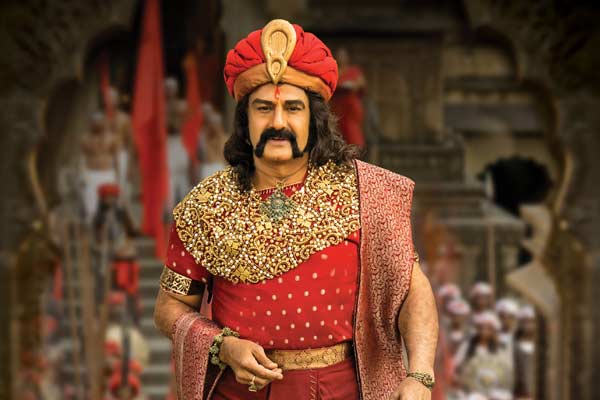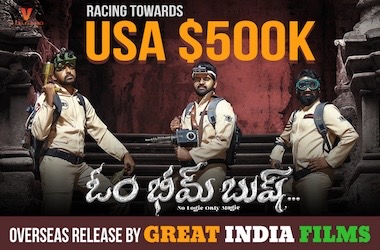
The screen opens to the kid’s conversation with his mother. He’s puzzled about the need for so many kingdoms and so many rulers to rule them.He swears on her to bring a day where there would just be one kingdom and one king to rule, in the place of so many. The proud mother laughs at her son’s simplistic solution of governance. We don’t see them having this dialogue, we get to hear them. What we instead get are visuals of sculptures from the era, that just about gain enough movement to come alive briefly, over the banter. It’s a poetic way to bring to life, an untold story of a legend whose life has hitherto been chronicled through sculptures mostly. These are grace notes of cinematic liberty and we get a glimpse of them, even before the first sequence begins to roll in.
We’ve had quite a few movies- effective ones – set in the times of emperors; Jodha Akbar, Bajirao Mastani to name a few. Gautamiputra Satakarni, set in the similar space does all that these movies did to service the legend and a little more. Akbar and Bajirao from the movies were well waxed fitness models, who could audition for Step-Up movies, who spoke and strode with English theatre precision. They could’ve been Hamlet or Caesar- albeit, in a different milieu – still made sense. Their enunciation was punctuated by exaggerated breathing, a pointy chin position and some times even fervent quivering. I’m not saying they were ineffective; that would be sacrilegious. Just that they spun a sensibility to their interpretation of these kings from thousands of year ago, to make them palatable to the hoi polloi of today. This is where Balakrishna’s Satakarni is a different creature. The character draws heavily from his impulsive offscreen persona as much as he draws from its towering stature. The result of this leverage is pure bliss onscreen. Satakarni is no fitness icon with a well waxed chest; in fact far from it. But his deft wielding of swords, the ferocity with which he acquaints to the battlefield, the glint in his eyes in his wife’s company and the authoritative gait that cuts him distinctly through a gathering more than make up for the thick waist and unruly grooming abilities. If anything it brings an air of authenticity to the proceedings. Why does every king played on the big-screen, need to possess boulder shoulders, well curated facial hair like men of these days. We know these men through scriptures and sculptures, at least whatever is left and authentic. Safely speaking, weren’t statements and faux-pas supposed to look way different, a few thousand years before Gold’s Gym, Naturals and Manish Malhotra happened?
The women in the movie are the only ones without a weapon, but are as strong as their male counterparts. Take for instance Vasishti (Satakarni’s wife), she’s no timid doll content on deriving warmth from the laurels of her luminous husband. Her ideologies don’t meet with his and she doesn’t shy away from the resultant friction as well. And once realisation dawns, she’s the one to forgive him and not the other way around. Not a big thing, one might say. But given the ecosystem in which the film is set and also the chauvinistic oeuvre of its lead, this is no mean feat. Shriya who plays Vashisti lends dignity, grace and seductive appeal to the character.
Epics are things of mythology; makings of fantasy. If actors bring them to vision, dialogues bring them to life. And the lines in the movie do exactly that. Every time as a king reads Satakarni’s letter of truce, the voice over echoes, “Sharanama? Ranama?“(Surrender or War?). Balakrishna might be a loud actor, but his prowess with the lines is a sheer love affair between phonetic beauty of the Telugu language and unbridled conviction. See him in that sequence, where he corners a traitor. Like a possessed man he flares up,”I defeated you, you didn’t change. I befriended you, you didn’t. I’ll now end your life, you needn’t at all.”
What’s a movie about an ambitious ruler, without his conquests in the battlefield. The war sequences have a hand made quality about them, the strategies and the tactics are industriously staged. As a result, we consistently see the war through him and sometimes around him, with a sense of vicarious participation. It’s infectiously delightful to watch him plot his battle moves in his camp, like a game of chess. A project this ambitious needs to be helmed from the thin space between heart and mind. Krish, director does this with fervent dexterity. His love for cinema; love for aesthetics, love for Telugu all of it comes to life in a picturesque Amaravathi, with extras who feel like citizens. An intimate moment between the king and the queen segues from the royal bedroom to a group of courtesans performing for the ministers, set to the tune of an enticing track. A film that finds the necessity to augment even its duets with narrative imagination is a special one, to which I doff my hat

















